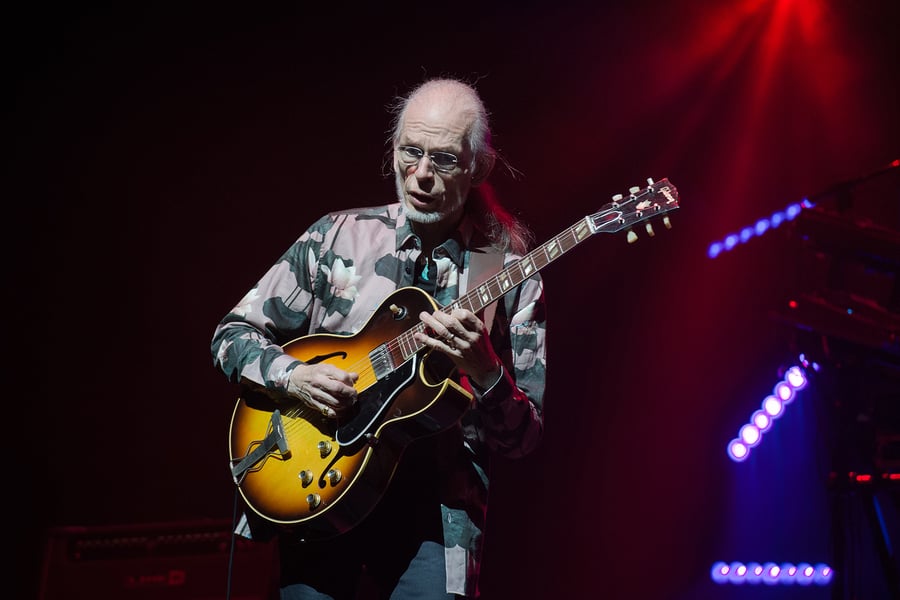Yes fans have spent the past 15 years hoping that the surviving members of the group will put aside their differences for a reunion tour, but guitarist Steve Howe tells Rolling Stone that that is a very unlikely proposition.
“I don’t think [the fans] should stay up late nights worrying about that,” he says. “There’s just too much space out there between people. To be in a band together or even to do another tour like Union is completely unthinkable.”
He’s referencing the group’s 1990 Union LP and tour, where two competing factions of Yes briefly joined forces. “It was difficult when we went through that, particularly because of the personalities,” Howe says. “I’m not saying any one person is to blame, but when you get a big hodgepodge like that together, it’s pretty much a nightmare. We made a nightmare of possibly a good thing back in 1990. I don’t think there is the stamina or the appetite for that kind of thing again.”
Howe last toured with frontman Jon Anderson and keyboardist Rick Wakeman in 2004. When the band returned to the road in 2008, Howe, drummer Alan White, and bassist Chris Squire (who died in 2015) were joined by Oliver Wakeman (son of Rick) and former Yes tribute band singer Benoît David. In recent years, Oliver Wakeman was replaced by Drama-era keyboardist Geoff Downes, and David was replaced by singer Jon Davison.
In 2015, Anderson and Rick Wakemen teamed up with “Owner of a Lonely Heart”-era guitarist Trevor Rabin and began touring as ARW. This created a rather tense situation where there were essentially two Yeses on the road at the same time. It only grew tenser in 2017 when ARW changed their name to Yes Featuring Jon Anderson, Trevor Rabin, Rick Wakeman.
It was at this moment that Yes were inducted into the Rock & Roll Hall of Fame, forcing both camps onto the stage together. They played “Owner of a Lonely Heart” and “Roundabout,” with Rush’s Geddy Lee handling the bass parts on the latter song. “I hope we came across as professionals, but it was certainly testing because that was before ARW disbanded and there was a fair bit of clash going on there,” Howe says. “But through professionalism, me and Alan went in there and worked with those guys and played a couple of songs.”
“I think everybody knew that it didn’t amount to much,” he continues, “not in terms of what Yes is capable of when you think of Close to the Edge or Relayer or Tales [From Topographic Oceans]. When you think of those albums or that music, it was a modicum offering of that era. If we got up and played ‘Close to the Edge,’ maybe that would have been saying something. But we didn’t. ‘Roundabout’ is nice and the other song is a nice song, although some people don’t want to play it anymore. Geddy didn’t, and I hear a couple of previous Yes members don’t want to play that song, either.”
Love Music?
Get your daily dose of everything happening in Australian/New Zealand music and globally.
Yes Featuring Jon Anderson, Trevor Rabin, Rick Wakeman (who played “that song” at every show) have been completely inactive since September 2018. Last year, Wakeman told Rolling Stone they were plotting a farewell tour. Earlier this year, however, Rabin indicated that the band was basically done. “I think that’s over,” he told ABC, pointing to the fact that the band never got around to recording anything new. “[Doing it again] without any new music to me seems like a bad idea.”
In March 2019, Anderson told Rolling Stone that he wanted to rejoin Howe in Yes. “I’m very open to it,” he said. “It’s been 50 years now. You think something has got to happen. To me, a great album has to be made. That’s what I think. I don’t know how it’s going to be made, but the final Yes event should happen. I’ve talked to a couple of people about it and they get it. I really want to do this.”
Later that year, Wakeman threw cold water onto that notion. “What would be achieved by everyone getting together and trying to do a reunion?” he told Rolling Stone. “We wouldn’t achieve anything.… What would you play? There’s no new, great material since [the Union tour]. There is nothing that has been recorded from any of the Yes camps where you can go, ‘Great! We can introduce that now.’ It will be the same classic stuff, really. If you were going to write something, how on earth would you do it with so many people? It would be really, really difficult.”
Howe basically feels the same way. “What I’ve done with Alan, and Chris until he passed, for the past 12 years has been trying to build something much more stable [than Union] and not so haphazardly sensational,” he says. “It’s not, ‘We’ve got a sensation here!’ That’s not it. Yes is about people who love working together and can. That word ‘can’ carries the whole story. That means compatibility and the same awarenesses about what we want to do. And I think we passed that point a long time ago.”



































